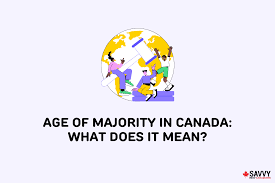The Age of Majority in Each Canadian Province and What It Means for You

Coming of Age: Understanding the Age of Majority in Canada
As you settle into Canada, whether as a newcomer or a young adult, understanding the concept of the "age of majority" is crucial. Unlike some countries with a single national age, Canada's legal age of majority varies by province and territory. This age dictates when an individual is legally considered an adult, granting them full rights and responsibilities. This guide will break down the age of majority across Canada and explain its significant implications for young adults.
What is the Age of Majority?
The age of majority is the legal threshold of adulthood as recognized by provincial or territorial law. Once a person reaches this age, they are legally considered an adult and gain the capacity to enter into contracts, vote, purchase alcohol and cannabis, and are held fully responsible for their actions.
Age of Majority by Province and Territory
While most of Canada sets the age of majority at 18, there are a few exceptions:
 Statutory Holidays in Canada: Which Days Are Off and How You Should Be Paid
Statutory Holidays in Canada: Which Days Are Off and How You Should Be Paid| Province/Territory | Age of Majority |
|---|---|
| Alberta | 18 |
| British Columbia | 19 |
| Manitoba | 18 |
| New Brunswick | 19 |
| Newfoundland and Labrador | 19 |
| Northwest Territories | 19 |
| Nova Scotia | 19 |
| Nunavut | 19 |
| Ontario | 18 |
| Prince Edward Island | 18 |
| Quebec | 18 |
| Saskatchewan | 18 |
| Yukon | 19 |
What the Age of Majority Means for You
Reaching the age of majority grants you several new rights and responsibilities:
1. Legal Capacity to Contract
You can legally enter into contracts, such as:
- Signing a lease agreement for an apartment.
- Taking out a loan or credit card.
- Signing employment contracts.
2. Voting Rights
You gain the right to vote in federal, provincial/territorial, and municipal elections (provided you are a Canadian citizen and meet other eligibility criteria).
 The Unwritten Rules of Tipping in Canada: A Guide for Every Situation
The Unwritten Rules of Tipping in Canada: A Guide for Every Situation3. Purchase of Age-Restricted Products
You can legally purchase and consume:
- Alcohol.
- Cannabis.
- Tobacco products.
4. Gambling
You can legally participate in gambling activities, such as casinos and lotteries.
5. Driving Privileges
While you can obtain a learner's permit and a graduated license before the age of majority, reaching this age often removes certain restrictions on your driving privileges.
 The Hidden Gem of Integration: Why You Should Join Your Local Community Centre
The Hidden Gem of Integration: Why You Should Join Your Local Community Centre6. Full Legal Responsibility
You are held fully responsible for your actions under the law. This means you can be sued, and you are responsible for your own debts and legal obligations.
7. Healthcare Decisions
You gain the right to make your own healthcare decisions without parental consent (though in some provinces, minors may have this right earlier for certain medical procedures).
Important Considerations for Young Newcomers
If you arrive in Canada as a minor and then reach the age of majority, be aware of these changes. It's a significant transition that impacts your legal standing and financial independence.
 The Subtle Art of Canadian Workplace Culture: 10 Things You Need to Know
The Subtle Art of Canadian Workplace Culture: 10 Things You Need to Know- Financial Independence: You become solely responsible for your financial decisions and debts.
- Housing: You can sign a lease independently.
- Employment: You may be able to work more hours or in certain jobs that were restricted to minors.
Conclusion: A New Chapter of Rights and Responsibilities
Reaching the age of majority in your Canadian province or territory marks a significant milestone, ushering in a new chapter of rights and responsibilities. Understanding these legal changes is crucial for navigating your adult life in Canada, from signing contracts to participating in elections. Embrace these new freedoms and responsibilities as you continue to build your life in your new home.

Related content